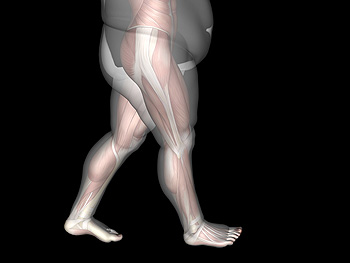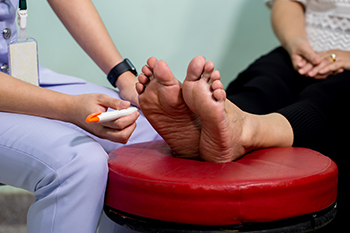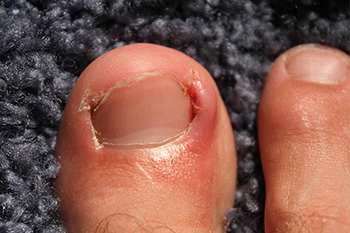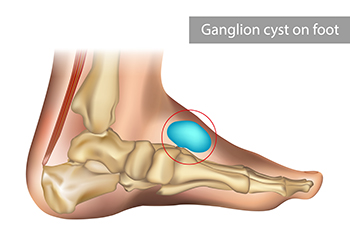Connect With Us
Blog
Items filtered by date: June 2023
Excessive Weight May Cause Foot Conditions

Research has indicated that the number of people who are obese has doubled across the globe in the last forty years, and being overweight often affects foot health. This can be a result of the added weight the feet must support, and daily activities may be difficult to complete. Higher body mass index may lead to developing certain foot conditions that can include plantar fasciitis, heel spurs, and Achilles tendon injuries. Overweight people can walk slower and have shorter stride lengths. Stress may be increased on the soft tissues and joints, which may lead to developing overuse injuries. Additionally, the ankles may lose strength from carrying the extra weight. Flat feet may develop for the same reason, and this can be another reason to lose excess weight. As this is being accomplished, it may be easier to build strength in the intrinsic muscles that can help to stabilize the arches. If you are overweight and have foot problems, it is suggested that you confer with a podiatrist who can help you to manage this condition.
Obesity has become very problematic at this point in time and can have extremely negative effects on the feet. If you’re an obese individual and are concerned about your feet, contact Gerald Erskine, DPM from Seneca Family Footcare. Our doctor can provide the care you need to keep you pain-free and on your feet.
Obesity and Your Feet
Since your feet are what support your entire weight when standing, any additional weight can result in pain and swelling. Being overweight is one of the main contributors to foot complications.
Problems & Complications
Extra Weight – Even putting on just a few extra pounds could create serious complications for your feet. As your weight increases, your balance and body will shift, creating new stresses on your feet. This uneven weight distribution can cause pain, even while doing the simplest tasks, such as walking.
Diabetes – People who are overweight are at serious risk of developing type-2 diabetes, which has a drastic impact on the health of your feet. As you get older, your diabetes might worsen, which could lead to loss of feeling in your feet, sores, and bruises. You could also become more prone to various infections.
Plantar fasciitis – Pressure and stress that is placed on muscles, joints, and tendons can trigger plantar fasciitis, which is an inflammation of tissue that forms along the bottom of the foot.
If you have any questions please feel free to contact our office located in Ronceverte, WV . We offer the newest diagnostic and treatment technologies for all your foot and ankle needs.
Foot Problems From Diabetes

Many people with diabetes develop foot pain that directly results from their disease. One such condition is diabetic neuropathy, which is caused by nerves that have been damaged by high levels of blood sugar. The cause of severe foot pain is known as focal neuropathy, which affects one nerve at a time. On the other hand, peripheral neuropathy affects all the nerves from the spine to the feet. Factors that make diabetic foot pain more likely to occur include uncontrolled blood sugar levels, poor blood flow to the feet, plaque buildup in the arteries and veins, and genetics. In addition, the risk of diabetic foot pain increases with alcohol abuse and smoking. Having diabetic neuropathy can lead to difficulty walking, foot ulcers, and frequent foot infections. A regular foot hygiene routine is the best way to prevent these conditions from forming or worsening. For more information about foot pain related to diabetes, it is suggested that you make an appointment with a podiatrist.
Diabetic foot care is important in preventing foot ailments such as ulcers. If you are suffering from diabetes or have any other concerns about your feet, contact Gerald Erskine, DPM from Seneca Family Footcare. Our doctor can provide the care you need to keep you pain-free and on your feet.
Diabetic Foot Care
Diabetes affects millions of people every year. The condition can damage blood vessels in many parts of the body, especially the feet. Because of this, taking care of your feet is essential if you have diabetes, and having a podiatrist help monitor your foot health is highly recommended.
The Importance of Caring for Your Feet
- Routinely inspect your feet for bruises or sores.
- Wear socks that fit your feet comfortably.
- Wear comfortable shoes that provide adequate support.
Patients with diabetes should have their doctor monitor their blood levels, as blood sugar levels play such a huge role in diabetic care. Monitoring these levels on a regular basis is highly advised.
It is always best to inform your healthcare professional of any concerns you may have regarding your feet, especially for diabetic patients. Early treatment and routine foot examinations are keys to maintaining proper health, especially because severe complications can arise if proper treatment is not applied.
If you have any questions please feel free to contact our office located in Ronceverte, WV . We offer the newest diagnostic and treatment technologies for all your foot and ankle needs.
Foot Wounds From Ingrown Toenails

It is important to take care of wounds on the feet immediately. These can come from a variety of sources, including ingrown toenails. This is a condition that develops when the toenail grows into the skin surrounding it instead of over it. The big toe is most likely to be impacted by this ailment. Everyone is at risk of developing ingrown toenails, particularly teens who often have sweaty feet from sports participation. It may also affect elderly people whose nails thicken as time passes. Ingrown toenails can occur from cutting toenails improperly, or if they have an irregular shape or are curved. Additionally, wearing shoes or socks that compress the toes can lead to getting an ingrown toenail. This problem can cause pain and swelling. Complications, namely infections from ingrown toenails, are most apt to happen to those with diabetes or conditions involving poor circulation. An infection from an ingrown toenail might present as red, bleeding, oozing pus, and an overgrowth of skin around the toe. Left untreated, this type of infection can impact the bone in the toe and lead to foot ulcers or open sores. If you have an ingrown toenail that is becoming worse or possibly infected, it is suggested that you see a podiatrist as soon as possible who can provide a proper diagnosis and treatment.
Wound care is an important part in dealing with diabetes. If you have diabetes and a foot wound or would like more information about wound care for diabetics, consult with Gerald Erskine, DPM from Seneca Family Footcare. Our doctor will assess your condition and provide you with quality foot and ankle treatment.
What Is Wound Care?
Wound care is the practice of taking proper care of a wound. This can range from the smallest to the largest of wounds. While everyone can benefit from proper wound care, it is much more important for diabetics. Diabetics often suffer from poor blood circulation which causes wounds to heal much slower than they would in a non-diabetic.
What Is the Importance of Wound Care?
While it may not seem apparent with small ulcers on the foot, for diabetics, any size ulcer can become infected. Diabetics often also suffer from neuropathy, or nerve loss. This means they might not even feel when they have an ulcer on their foot. If the wound becomes severely infected, amputation may be necessary. Therefore, it is of the upmost importance to properly care for any and all foot wounds.
How to Care for Wounds
The best way to care for foot wounds is to prevent them. For diabetics, this means daily inspections of the feet for any signs of abnormalities or ulcers. It is also recommended to see a podiatrist several times a year for a foot inspection. If you do have an ulcer, run the wound under water to clear dirt from the wound; then apply antibiotic ointment to the wound and cover with a bandage. Bandages should be changed daily and keeping pressure off the wound is smart. It is advised to see a podiatrist, who can keep an eye on it.
If you have any questions, please feel free to contact our office located in Ronceverte, WV . We offer the newest diagnostic and treatment technologies for all your foot care needs.
Ganglion Cysts on the Feet

A ganglion cyst on the foot develops near joints or tendons, of which there are many in the foot. It is like a soft pebble filled with a gel-like fluid and is noncancerous. In many cases, a ganglion cyst will disappear or gradually diminish in size, despite the fact it can be quite painful and tender to the touch. Symptoms of a ganglion cyst are a noticeable lump, a tingling or burning pain if it touches a nerve, and irritation that can happen while wearing shoes. A ganglion cyst forms when synovial fluid leaks from a joint or tendon and collects in a sac under the skin. If it is particularly painful and interferes with the completion of your daily activities, a podiatrist can drain the cyst of its fluid and inject it with medication. It is very dangerous to try to pop a ganglion cyst yourself, as this may cause further damage and increase the risk of infection. In severe cases, surgery can be an option. For help with a ganglion cyst on the foot, it is suggested that you make an appointment with a podiatrist who can determine the best options to treat a ganglion cyst.
Foot Pain
Foot pain can be extremely painful and debilitating. If you have a foot pain, consult with Gerald Erskine, DPM from Seneca Family Footcare. Our doctor will assess your condition and provide you with quality foot and ankle treatment.
Causes
Foot pain is a very broad condition that could be caused by one or more ailments. The most common include:
- Bunions
- Hammertoes
- Plantar Fasciitis
- Bone Spurs
- Corns
- Tarsal Tunnel Syndrome
- Ingrown Toenails
- Arthritis (such as Gout, Rheumatoid, and Osteoarthritis)
- Flat Feet
- Injury (from stress fractures, broken toe, foot, ankle, Achilles tendon ruptures, and sprains)
- And more
Diagnosis
To figure out the cause of foot pain, podiatrists utilize several different methods. This can range from simple visual inspections and sensation tests to X-rays and MRI scans. Prior medical history, family medical history, and any recent physical traumatic events will all be taken into consideration for a proper diagnosis.
Treatment
Treatment depends upon the cause of the foot pain. Whether it is resting, staying off the foot, or having surgery; podiatrists have a number of treatment options available for foot pain.
If you have any questions, please feel free to contact our office located in Ronceverte, WV . We offer the newest diagnostic and treatment technologies for all your foot care needs.

